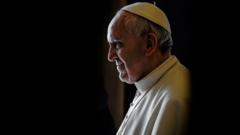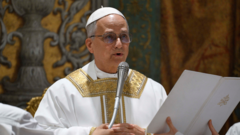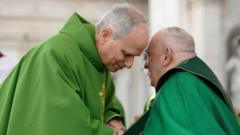Pope Francis, the first Pope from the Americas, redefined the role of the papacy through his focus on humility, social justice, and interfaith dialogue while facing challenges within the Church and health issues.
Pope Francis: A Legacy of Humility and Global Outreach

Pope Francis: A Legacy of Humility and Global Outreach
The unprecedented papacy of Pope Francis, marked by reform, simplicity, and a commitment to social justice, reshaped the Catholic Church's global presence.
Pope Francis, who made history as the first pontiff from the Americas and the Southern Hemisphere, has left an indelible mark on the Catholic Church during his tenure. Elected Pope in 2013, the 76-year-old Cardinal Jorge Mario Bergoglio from Argentina emerged as a pivotal figure within the Vatican, representing a departure from tradition not only because of his background but also due to his confluence of conservative and liberal views. His papacy initiated a period of transformation, emphasizing humility, outreach to the poor, and interfaith dialogue.
Upon taking office, Francis's informal approach was immediately apparent; he engaged with his cardinals in a standing position rather than on the papal throne, reflecting his desire to prioritize connection over grandeur. His insistence on a “poor Church for the poor” resonated with many followers of the faith’s 1.2 billion constituents. Despite his humble demeanor, Francis encountered resistance from some corners of the Vatican bureaucracy, particularly from traditionalists who remain loyal to his predecessor, Benedict XVI, who passed away in 2022.
Born in Buenos Aires to Italian emigrants on December 17, 1936, Francis grew up in a modest household, nurtured by his parents' fleeing of fascism. His early career included various roles—from a nightclub bouncer to a chemist—before he joined the Jesuit order and rose quickly through the ecclesiastical ranks. While his life story is compelling, it also includes complexity; accusations regarding his perceived inadequate opposition to Argentina's military dictatorship during the Dirty War continue to haunt him, despite his denials.
Throughout his papacy, Francis has made significant strides in promoting peace and empathy. His diplomatic interventions led to historic meetings between religious and political leaders. Among these, his uniquely Spanish-speaking perspective aided the U.S. in diplomatically engaging with Cuba, showcasing distinct challenges not typically addressed by European Popes. Francis has always reminded the Church to avoid focusing solely on its traditions but rather return to its mission of service and compassion for the marginalized.
Despite facing criticism from various factions within the Church regarding his stances on key issues, including child abuse and the inclusion of divorced and remarried Catholics, Francis maintained a traditional approach on many doctrinal matters while advocating for social justice. He impressively reconciled interfaith relations, developing meaningful relationships within the global Christian community.
In the later years of his papacy, Francis has had to grapple with multiple health-related challenges, including severe pneumonia in 2023, leading to increased vulnerabilities. Nevertheless, he remains dedicated to his mission to reshape the Church into a beacon of hope amidst a changing world. His decision to forgo the luxurious Apostolic Palace in favor of simpler living further exemplifies his commitment to humility.
As he reflects on his legacy, Pope Francis hopes to ensure that the Church is not stifled by its own structural issues and calls upon it to project a caring figure on the global stage. He continues to assert that a Church must engage with the world, marking his papacy as a era of significant though complex change.
Upon taking office, Francis's informal approach was immediately apparent; he engaged with his cardinals in a standing position rather than on the papal throne, reflecting his desire to prioritize connection over grandeur. His insistence on a “poor Church for the poor” resonated with many followers of the faith’s 1.2 billion constituents. Despite his humble demeanor, Francis encountered resistance from some corners of the Vatican bureaucracy, particularly from traditionalists who remain loyal to his predecessor, Benedict XVI, who passed away in 2022.
Born in Buenos Aires to Italian emigrants on December 17, 1936, Francis grew up in a modest household, nurtured by his parents' fleeing of fascism. His early career included various roles—from a nightclub bouncer to a chemist—before he joined the Jesuit order and rose quickly through the ecclesiastical ranks. While his life story is compelling, it also includes complexity; accusations regarding his perceived inadequate opposition to Argentina's military dictatorship during the Dirty War continue to haunt him, despite his denials.
Throughout his papacy, Francis has made significant strides in promoting peace and empathy. His diplomatic interventions led to historic meetings between religious and political leaders. Among these, his uniquely Spanish-speaking perspective aided the U.S. in diplomatically engaging with Cuba, showcasing distinct challenges not typically addressed by European Popes. Francis has always reminded the Church to avoid focusing solely on its traditions but rather return to its mission of service and compassion for the marginalized.
Despite facing criticism from various factions within the Church regarding his stances on key issues, including child abuse and the inclusion of divorced and remarried Catholics, Francis maintained a traditional approach on many doctrinal matters while advocating for social justice. He impressively reconciled interfaith relations, developing meaningful relationships within the global Christian community.
In the later years of his papacy, Francis has had to grapple with multiple health-related challenges, including severe pneumonia in 2023, leading to increased vulnerabilities. Nevertheless, he remains dedicated to his mission to reshape the Church into a beacon of hope amidst a changing world. His decision to forgo the luxurious Apostolic Palace in favor of simpler living further exemplifies his commitment to humility.
As he reflects on his legacy, Pope Francis hopes to ensure that the Church is not stifled by its own structural issues and calls upon it to project a caring figure on the global stage. He continues to assert that a Church must engage with the world, marking his papacy as a era of significant though complex change.





















